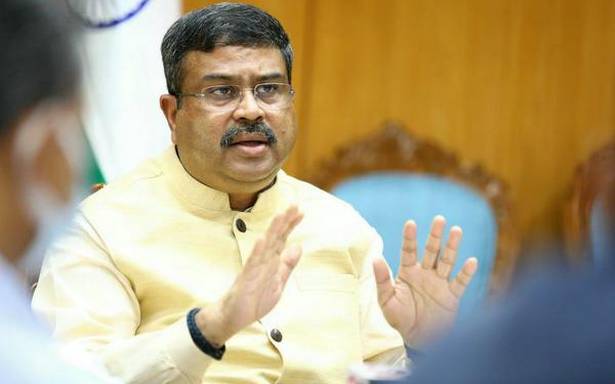Dharmendra Pradhan tells V-Cs to work on mission mode to finish the task
Central universities have been given a two-month deadline to fill up their 6,000 plus vacancies, which form a third of all sanctioned faculty positions.
“Let us work on a mission mode. During Shikshat Parv [Education Festival], let us start a campaign, a mission to fill up these 6,000 seats within September and October,” said Education Minister Dharmendra Pradhan in his first interaction with the Vice-Chancellors of 45 Central universities on Friday.
He added that while there may be a few anomalies at some universities, all institutions should advertise their vacant posts by September 10.
Vice-Chancellors who participated in the meeting said there was a special focus on backlog vacancies — positions which have not been filled despite having been advertised — as well as on vacant positions which have been reserved for Scheduled Caste, Scheduled Tribe and Other Backward Class communities. Out of 6,229 vacant positions, 1,767 were for the OBC category, 1,012 for the SCs and 592 for the STs, Mr. Pradhan said.
As institutions start reopening their doors for physical classes after the COVID-19 shutdown, Mr. Pradhan urged them to be accommodative to students, but ensure that teaching and learning does not get disrupted. “On any campus, there may be student rebellion. On a campus, all live under a disciplinary framework, with commitment to the Constitution. But in a democracy, there must be accommodation and flexibility. The Vice-Chancellors are the custodians to ensure that the primary work of a university of teaching and learning does not get compromised,” he said.
Pat for JNU
Mr. Pradhan praised Jawaharlal Nehru University for introducing a new course on counter-terrorism that has come in for criticism for referring to “jihadi terrorism” as the only form of fundamentalist religious inspired terrorism. The course is meant for engineering graduate students specialising in international relations.
“Our engineers today are not just engineers. If a course helps engineering students understand the kind of obstacles they could face in developing social products, then I congratulate JNU for introducing such a course,” he said.
Focus on mother tongue
The Education Minister also emphasised the importance of using Indian languages in education at all levels, as recommended by the National Education Policy. He said he was not opposed to the English language in principle, and accepted that foreign languages helped Indians participate in the global economy, but pointed out that, prime importance had to be given to the mother tongues of learners.
With regard to other reforms proposed by the NEP such as four-year degrees and the academic credit bank, he urged the Vice-Chancellors to hold consultations and prepare the framework to begin implementation by 2022, but also acknowledged that universities had autonomy in their roll-out strategy given their differing challenges.
Source: Read Full Article

